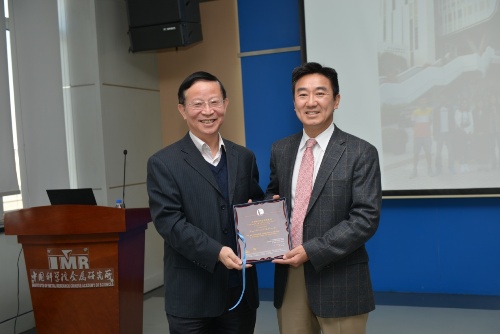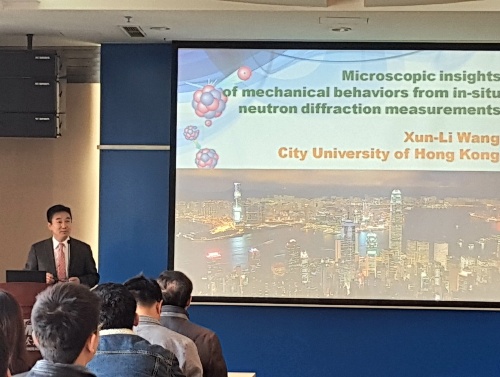The recipient of 2018 Lee Hsun Lecture Series—Lee Hsun Lecture Award, Prof. Xun-Li Wang from City University of Hong Kong visited Institute of Metal Research, Chinese Academy of Sciences (IMR, CAS) from October 18 to 20, 2018.
During the visit, Prof. Wang delivered a lecture entitled “Microscopic Insights of Mechanical Behaviors from Neutron Diffraction Measurements”. In his lecture, he used several examples, from residual stress mapping in welds to in-situ loading studies of nanostructured and metallic glass alloys, to illustrate how this technique is used to gain microscopic insights of mechanical behaviours in engineering materials.
Prof. Wang received his Ph.D. from Iowa State University and B.S. from Peking University, both in Physics. In August 2012, he joined the City University of Hong Kong as a Chair Professor and Head of the Department of Physics and Materials Science.
Prior to assuming the current position, Prof. Wang had been working at Oak Ridge National Laboratory in the US, rising through the ranks to Distinguished Staff Member, the 2nd highest technical rank at the laboratory. As a senior scientist in the Neutron Science Directorate, he led innovative research, using neutron scattering as a primary tool, to understand deformation and phase transformation behavior in complex materials. He is also an Adjunct Professor in the Department of Materials Science and Engineering, University of Tennessee, Knoxville.
In 2006-2011, Prof. Wang was Group Leader of the Powder Diffraction Group in the formerly Neutron Scattering Science Division, which is responsible for eight instruments at the Spallation Neutron Source (SNS) and the High Flux Isotope Reactor (HFIR), two world-leading facilities in neutron science. The group doubled in size during this dynamic period, with about 20 permanent staff, postdocs, visiting scientists, and students, and an annual budget in excess of $5 million USD. In 1999 - 2011, he served as lead instrument scientist and project manager for VULCAN, a dedicated engineering diffractometer at the SNS. Funded at a total cost of more than $16 Million US Dollars, the instrument was recently referred to by users as a “Perfect Instrument.” according to a Press Release by Oak Ridge National Laboratory.
Prof. Wang’s research interests included superconductors, metallic glasses, nanostructured materials, and recently magnetic shape memory alloys. He authored more than 150 referred publications in journals, books, and conference proceedings. He has published broadly in high-impact journals including Science, Nature Materials, Advanced Materials, Physical Review Letters, and Progress in Materials Science. He is an elected Fellow of the American Physical Society, and his early work on welding residual stresses was awarded an A. F. Davis Medal by the American Welding Society. He is a PI or Co-PI of several large research grants, most recently the US NSF Major Research Instrumentation grant ($1.6 Million USD) on “Development of a Neutron Electrostatic Levitator.” In 2009, he was named a Changjiang Chair Professor by the Ministry of Education, People’s Republic of China. He was also elected Fellow of American Physical Society in 2010 and Fellow of American Association for Advancement of Science in 2017.

Prof. ZUO Liang, the Director of IMR presents the plaque of Lee Hsun Lecture Series to Prof. Xun-Li Wang. (Image by IMR)

Prof. Xun-Li Wang delivers a lecture. (Image by IMR)